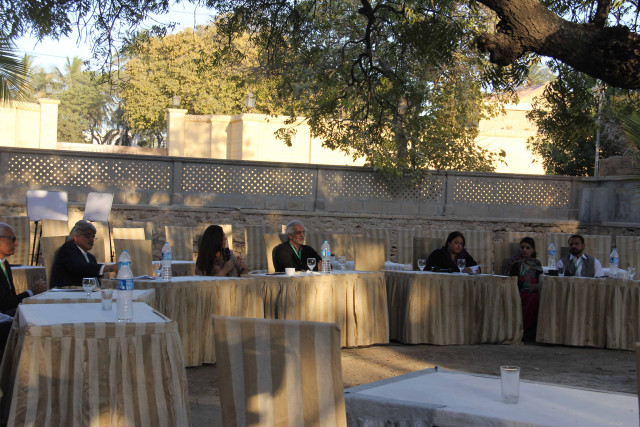With more people moving to cities, the media has work to do
Ayesha Tammy Haq said that in Pakistan, the media has gone through expansion and is enjoying a tremendous power.

Participants at the media round table. PHOTO: EXPRESS
Though the discussion swayed from its topic ‘Media and Communication in the City’ to the role of the media in a more general way, the polarized discussants freely criticized and sympathized with the media for its present role in urban settings.
Lawyer and journalist Ayesha Tammy Haq said that in Pakistan, the media has gone through expansion and is enjoying a tremendous power. It is working as a watchdog and as a result of its position and role in society, it is an opinion maker. It should show more responsibility in formulating public opinion.
Former caretaker finance minister and economist Salman Shah said that the media has a multi-dynamic impact and it is an engine of growth and transition but it is not really aware of what it is actually doing to society with its power. He said that generally the media is ignorant of its role and this is critical.
Ahmed Shabbir said that the media needs to play the role of a catalyst. With urbanization taking place and more and more people wanting to move to cities, the media should help explain how they should provide basic facilities like water and maintain the environment rather than encouraging civic agencies to push entrants out. Most important of all is developing the understanding how people will need to commute.
Shahid Abdulla said that the media is playing an important role by pointing out the difference between right and wrong. He said that it is the media that has created so much awareness that even a child understands a little of politics today.
Youth trainer Nisar Moosa said that the media is not giving enough space and time to the youth and their social and economic problems and thus it is doing them an injustice. He objected to the media glamorising cases like those of divorces, which it should not. He said that our media is carelessly highlighting sensitive subjects. He said that the youth are less aware of their real heroes.
Ayesha Tammy Haq said that we cannot blame the media for everything. She said that the media shows what is generated by the society around it. It will show you if the city’s fathers are promoting good things in the city. She said that the media sensationalizes because that sells.
Abdul Jaleel, an anchorperson from Islamabad, said that media bosses decide what has to be aired on a commercial basis. A scholar from NED University of Engineering and Technology, quoted a survey conducted in Karachi and said that a high majority of respondents were not happy with the way the media was reporting events in their city and they wanted a change.
Shabina Faraz, an environment reporter, said that media owners control the content and they are concerned with ratings. She said that there has been an improvement but it would not be justice to look to the media for everything as there are other factors involved also.
Jahangir Khan, the president of the Institute of Architects, Karachi, said that the media is free and it should adopt a responsible attitude from inside and not be made accountable from the outside.
Concluding the discussion, Vandana Mehra of the Water and Sanitation Programme, South Asia, New Delhi, said that although most of the discussants and participants expressed negative feelings about the media it has done good things as well and that she hopes for an improvement in reporting with the passage of time.



















COMMENTS
Comments are moderated and generally will be posted if they are on-topic and not abusive.
For more information, please see our Comments FAQ